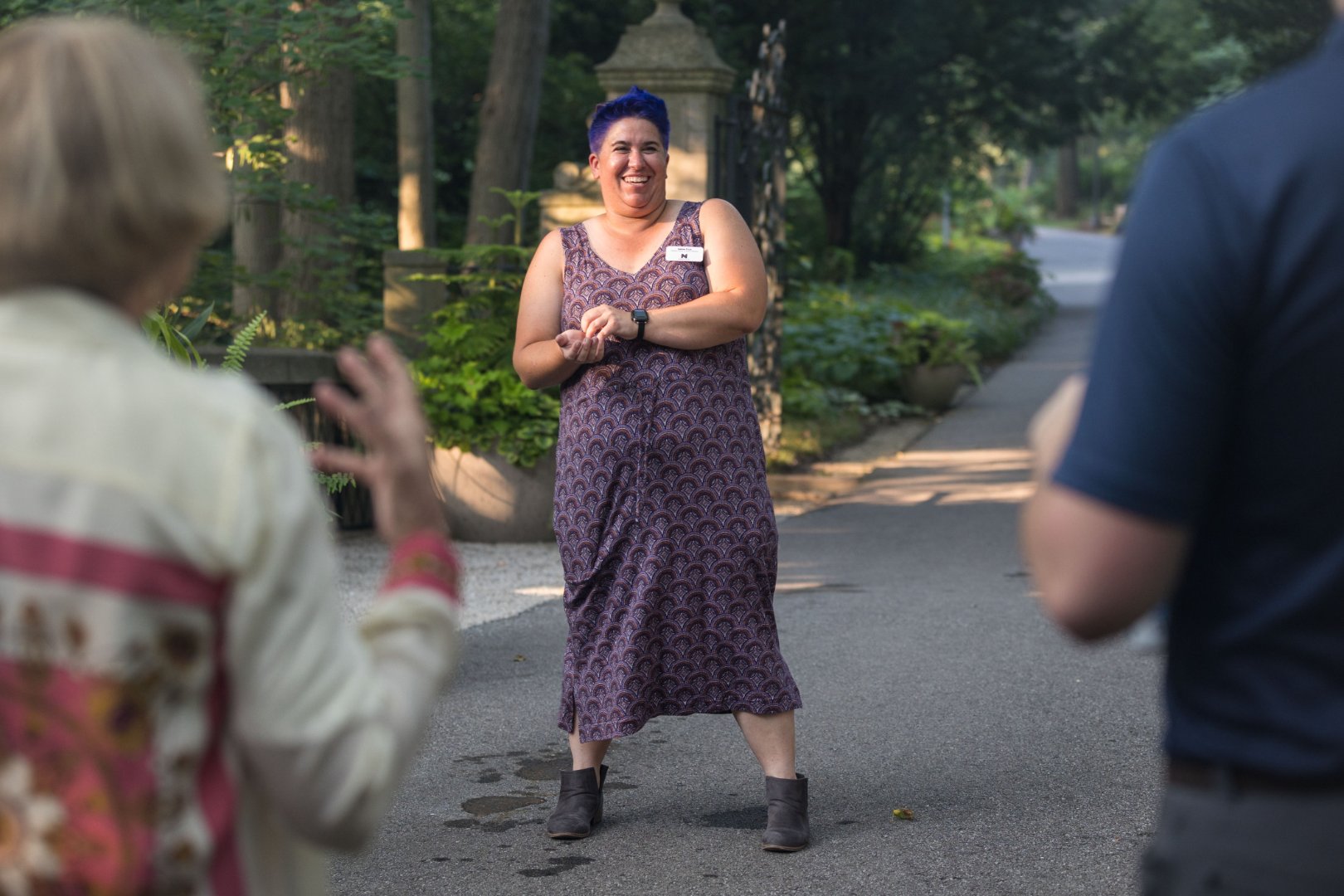Out With Offensive Plant Names

Image Caption: Jaime Frye, Associate Curator of Living Collections at Newfields presented at Curator's Choice in August 2023.
The International Code of Nomenclature (or simply, The Code) for algae, fungi, and plants has stood, at times, unbothered by any large-scale shifts due to its effectiveness and widespread acceptance among the worldwide scientific community. However, this summer, Newfields' own Jaime Frye contributed to significant positive changes. Here's how.
Over four years ago, as chair of the Plant Nomenclature & Taxonomy Community of the American Public Gardens, she was posed with the issue of vernacular plant names containing derogatory phrases.
Since then Frye, Associate Curator of Living Collections at Newfields, has worked tirelessly to make change.
Upon listening to a shared sentiment amongst her peers, Frye and dozens of volunteers spent over 500 hours gathering 400,000 lines of plant common names across 30 institutions and ran the data through a base of 1,700 potentially harmful words – in the end, Frye and her colleagues gathered a list of 227 plant names to review. You can read more about that process in an article Jaime wrote for Newfields in May of last year, What’s in a Name.
In the midst of the ever-hectic summer months for the horticulture team at Newfields, Frye was an inaugural recipient of the Sowing Excellence Award, which is awarded by the United States Botanic Garden (USBG) and IDEA Center for Public Gardens to highlight individuals who “promote the connection between plants and people and emphasizes the significance of the role of plants in our world.”
"I feel like botanists, public garden people — we’re just trying to make the world a better place through plants,”
Jaime Frye explained to Ari Daniel in her interview with NPR.
Frye’s recognition for the Sowing Excellence Awards included financial support to attend the International Botanical Conference (IBC) in Madrid, Spain in July 2024, where she presented her research on derogatory plant-naming at a special session that happens only once every six years – The Nomenclature Section.
The Nomenclature Section is an opportunity for botanists, horticulturists, and public garden professionals to amend The Code. In an interview with Ari Daniel, Science & Health Reporter at National Public Radio Frye explained, “The Code is a document of the laws of plant-naming." She continued, "It is not meant to be something that can be changed in an instant. It is meant to be this stable thing." Despite that, "Some big wins happened at this nomenclature section – some really big wins from my perspective.”
Some proposals are simple and administrative, but others have far-reaching impact that can ripple throughout the world’s public gardens community. Out of the 433 proposals that made it to vote, Frye pointed out a few of the really big wins:
Most significantly, article 61.6 was passed. The proposal was based on changing the derogatory naming of 56 active plant names deriving from an African racial slur. The new base name for these species changed to “afra,” creating a new respectful name change for all species affected.
And, a new addition to The Code (article 51.2) passed stating new botanical names can be proposed to be rejected if they are derogatory to a group of people.
The final notable win from the week was the establishment of the Special Purpose Committee for Ethics in Nomenclature. This committee, founded for maintaining and surveying ethics in nomenclature, will continue to develop relationships with communities that may be harmed by plant names across the scientific community and around the world. “My hope is that the Special Purpose Committee will be able to help create recommendations and a framework for how we start having these conversations. For real change to be made, it can’t just be the scientific community... We really need to make sure, as a group, that we are seeking a hand-in-hand, trust-filled dialogue,” she said.
It is clear why Jaime Frye was chosen to be a recipient of the Sowing Excellence award, and the gratitude and respect that Frye has for the recognition will only motivate her in the continued research that comes with a project of this magnitude.
Frye and her colleagues’ work has been garnering coverage from reputable publications, as well. Articles from Smithsonian Magazine and The Guardian elaborate on the progression of removing derogatory phrasing from the scientific community. The Newfields community is thrilled to celebrate Jaime’s accomplishments.
Image Credits: The Wild Birds Unlimited Native Pollinator Meadow in The Virginia B. Fairbanks Art & Nature Park at Newfields. 2023.




